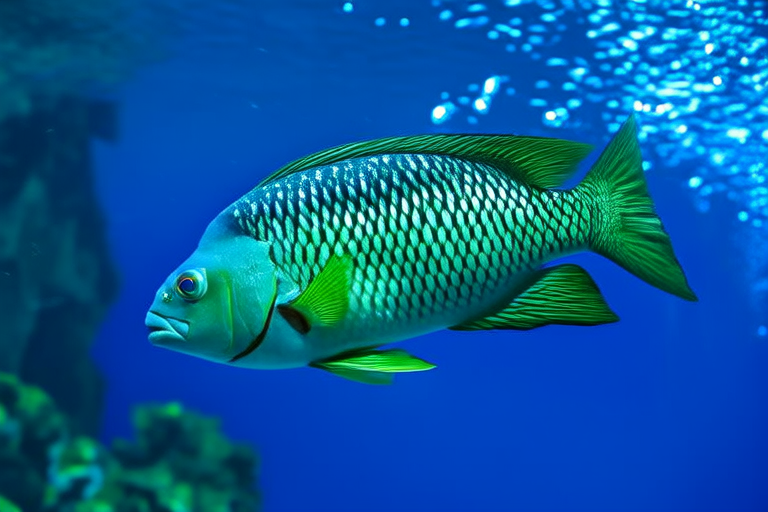Saving Our Oceans One Parrot Fish at a Time
The world’s oceans are under threat like never before. Pollution, overfishing, and climate change are just some of the challenges facing marine life. However, there is hope. By focusing on one particular species, we can make a significant difference. Enter the parrotfish – a colorful and vital inhabitant of coral reefs that plays a crucial role in maintaining the health of these underwater ecosystems.
The Grazing Habits of Parrotfish
Parrotfish are known for their unique grazing habits. They have beak-like mouths equipped with rows of teeth that allow them to scrape algae off coral surfaces. This process, called bioerosion, is essential for keeping coral reefs clean and healthy. Without parrotfish, algae can grow unchecked, smothering corals and preventing new growth. In fact, it has been estimated that a single large parrotfish can consume up to four tons of algae per year.
Dr. Christine Jacobson, a marine biologist specializing in coral reef ecology, explains, “Parrotfish act as nature’s gardeners. Their grazing helps maintain a balance between coral and algae, ensuring that the reef remains vibrant and productive.”
The Impact of Parrotfish Decline
The decline of parrotfish populations has severe consequences for ocean ecosystems. Overfishing, habitat destruction, and pollution are all contributing factors to this decline. Without enough parrotfish to keep algae in check, coral reefs become vulnerable to disease and bleaching events, which can lead to widespread death of corals.
In areas where parrotfish populations have been severely depleted, such as parts of the Caribbean, scientists have observed significant declines in coral cover. Dr. Jacobson notes, “When parrotfish numbers drop, it’s often a sign that the entire ecosystem is under stress. We need to protect these fish if we want to preserve coral reefs for future generations.”
Actionable Steps to Support Parrotfish Populations
There are several things that individuals can do to support parrotfish populations and promote overall ocean health:
- Reduce plastic waste: Plastic pollution harms marine life, including parrotfish. By reducing your use of single-use plastics and properly disposing of waste, you can help protect these fish and their habitats.
- Eat sustainable seafood: Many popular seafood dishes, such as grouper and snapper, compete with parrotfish for food sources. Choosing sustainably sourced seafood helps reduce pressure on these fish populations.
- Support marine conservation efforts: Organizations like The Nature Conservancy and Reef Check work to protect coral reefs and the species that depend on them. Donating time or money to these groups can make a big difference.
- Advocate for stronger environmental policies: Contacting elected officials and supporting legislation that protects marine environments can help ensure that parrotfish and other species have a chance to thrive.
Real-World Examples of Success
Several successful initiatives have demonstrated the positive impact of protecting parrotfish. For example, in the Bahamas, a network of marine protected areas (MPAs) was established to safeguard coral reefs and their inhabitants. Since the implementation of these MPAs, parrotfish populations have rebounded, leading to healthier reefs and improved fisheries.
In Palau, a country known for its stunning coral reefs, a national marine sanctuary was created to protect nearly 80% of the nation’s waters. This sanctuary not only benefits parrotfish but also supports local communities by promoting eco-tourism and sustainable fishing practices.
Expert Opinions
Experts agree that protecting parrotfish is key to preserving coral reefs. Dr. Jacobson emphasizes, “We must recognize the value of these fish and take action to ensure their survival. By doing so, we are not only helping parrotfish but also safeguarding the future of our oceans.”
Professor Michael Graham, a marine ecologist at the University of California, Santa Cruz, adds, “The decline of parrotfish is a warning sign that our oceans are in trouble. It’s time for us to take responsibility and make changes that will benefit both marine life and human communities.”
Conclusion
Saving our oceans one parrotfish at a time may seem like a small step, but it is a crucial one. By understanding the importance of parrotfish and taking action to protect them, we can help ensure the health and resilience of coral reefs and the many species that depend on them. Together, we can make a difference and create a brighter future for our oceans.
